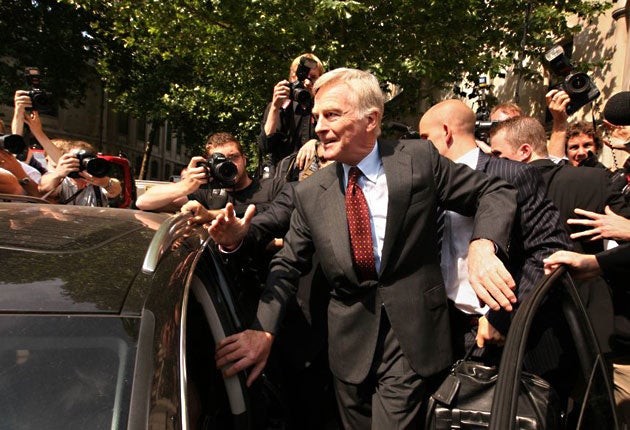Mosley's crusade to banish 'kiss and tells'

Your support helps us to tell the story
From reproductive rights to climate change to Big Tech, The Independent is on the ground when the story is developing. Whether it's investigating the financials of Elon Musk's pro-Trump PAC or producing our latest documentary, 'The A Word', which shines a light on the American women fighting for reproductive rights, we know how important it is to parse out the facts from the messaging.
At such a critical moment in US history, we need reporters on the ground. Your donation allows us to keep sending journalists to speak to both sides of the story.
The Independent is trusted by Americans across the entire political spectrum. And unlike many other quality news outlets, we choose not to lock Americans out of our reporting and analysis with paywalls. We believe quality journalism should be available to everyone, paid for by those who can afford it.
Your support makes all the difference.For some litigants, the award of £60,000 and a declaration that a liking for sado-masochistic orgies with prostitutes is broadly nobody else's business would have been a satisfactory outcome. But not all litigants are 68-year-old Formula One bosses with a burning sense of injustice and a desire to foist a privacy law on Britain.
Max Mosley who this summer won damages at the High Court in London from the News of the World after the newspaper claimed that a sex party attended by him involved Nazi role-playing, will today take a case to the European Court of Human Rights (ECHR) to force a change in British law which would require editors to contact the subjects of any revelations before publishing allegations about their private lives.
The president of the FIA, the governing body of the £2bn Formula One industry, said the finding of Mr Justice Eady in July that his privacy had been infringed by the Sunday tabloid when it published lurid details of a sex party involving five prostitutes – along with the award of £60,000 in damages and £450,000 in costs – was not sufficient "remedy" for his complaint.
Mr Mosley said: "I feel a great wrong has been done to me. Anyone who is a victim of this situation has to publicise all over again the very thing they are trying to keep private. If I had been notified first, it wouldn't have necessarily stopped them publishing, but at least I could have challenged it in front of an independent person." Lawyers for Mr Mosley, the son of the 1930s British fascist leader Sir Oswald Mosley, said yesterday that they want to persuade the ECHR in Strasbourg to change UK rules, which allow allegations to be published without the prior knowledge of an individual or the courts, to ensure that a judge is permitted to scrutinise any claims before they are made public.
Dominic Crossley, the lawyer representing the multimillionaire, said: "The only effective remedy [open to Mr Mosley] would have been to prevent the publication in the first place by means of an injunction but because he did not know about the article beforehand the opportunity of an injunction was not open to him."
Mr Crossley added that if the application was successful "everyone in the UK will equally share in the right to have an editor's decision to publish reviewed by a judge before irreparable damage can be done".
Legal experts warned that such a move could lead to damaging curbs on freedom of speech and impinge on the ability of the newspapers and broadcasters to expose corruption in the public interest. Mark Stephens, a leading media lawyer, said: "This would shear the media of the ability to report matters of public interest and thus look into corruption lurking in those dark corners the rich and powerful would rather were kept out of sight.
"It is part of our system that an editor should be able to choose to publish and deal with the consequences. There is a tension between the right to privacy and the right to know and the checks and balances that currently we have within English law achieve the correct balance."
The publication in March this year of graphic images of Mr Mosley engaged in sado-masochistic acts with call girls speaking German and dressed in pseudo-militaristic clothing sparked widespread calls for him to stand down from his FIA post. George Carey, the former Archbishop of Canterbury, criticised his "unspeakable and indecent behaviour".
Although the Formula One boss never denied taking part in the orgy and apologised for "the embarrassment the revelations caused", he fervently denied that there was any Nazi theme to the party. After a week of lurid evidence in which the High Court was asked to consider the increased likelihood of an S&M habitué bleeding and one of the prostitutes involved offering to don one of the uniforms used in the session, it was found that Mr Mosley's sexual tastes, "albeit unconventional", had not involved any Nazi overtones.
Mr Mosley said: "I think it's wrong that a tabloid editor can destroy a family and wreck a life without being answerable to anybody just to sell newspapers. The chance of being sued is very small, the damages are not very big and it is a worthwhile risk."
The motor sport magnate, who will stand down from the FIA when his four-year term expires in 12 months, is seeking to expose those who led to his activities being recorded on covert cameras. He believes those responsible were "something to do with motor racing".
Join our commenting forum
Join thought-provoking conversations, follow other Independent readers and see their replies
Comments